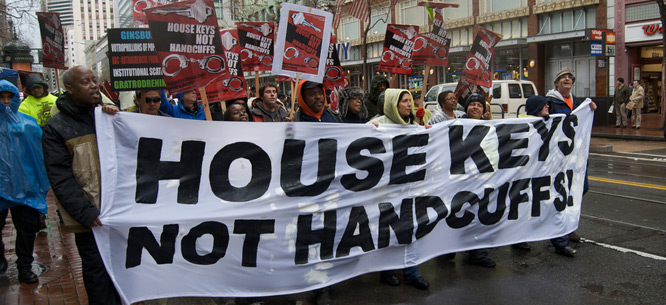The Limits of the “Left Coast Formula”: A Response to James N. Gregory
The Limits of the “Left Coast Formula”: A Response to James N. Gregory

As a lifetime resident of coastal California whose community activism dates back to Peoples Park (Berkeley, 1969), I turned with interest to James N. Gregory’s “Seattle’s Left Coast Formula” (Dissent, Winter 2015)—and came away mystified.
According to Gregory, “Seattle shares with other West Coast cities, especially San Francisco,” a “political tradition” that combines “resurgent radicalism and radical re-urbanization.” By “radical re-urbanization,” he means a real estate boom, currently exemplified in Seattle by the conversion of a half-square mile warehouse district into “Amazonia,” a high tech “campus” planned to house nearly 30,000 employees.
“It is one of the symptoms of the left coast formula,” Gregory writes,
That these two Seattles have so far managed to peacefully co-exist. The billionaires have remained silent as the city council passes minimum wage and other social justice measures, and progressives have been almost equally quiet as Amazonia takes shape. . . .
Like San Francisco, Seattle settled into a politics that is relatively uncontentious, sometimes experimental, and proudly tolerant, while remaining friendly to business and mostly blind to deep-seated inequalities.
This formula may apply to Seattle; it doesn’t remotely pertain to San Francisco or to my hometown of the past twenty-five years, Berkeley—at least not since the sixties.
Far from being “relatively uncontentious,” the politics of these two cities have repeatedly been riven by fierce battles over development and social justice. And instead of sitting quietly on the sidelines, progressives have been in the thick of those battles.
A short list of such fights:
San Francisco: Freeway revolts (1950s to 1960s); urban renewal protests (late 1960s to early 1970s); rent control (1970s); campaign to limit office development (1980s); Mission anti-gentrification and -displacement movement (late 1990s to 2000s); campaigns to retain affordable housing and blue-collar jobs (current).
Berkeley: Rent control (1970s to 1980s); West Berkeley industrial/artisanal retention (1980s to 1990s, and again in 2012); opposition to UC Berkeley Long Range Development Plan (2000s); downtown overdevelopment and gentrification (current).
As Gregory writes, Seattle’s “big sister,” San Francisco, “is dealing with its own chronicle of Nerdia, as Silicon Valley techies take over what had once been mixed-income neighborhoods.”
But in San Francisco, progressives are defying that takeover, pushing back in city hall, the streets, and the voting booth, and advancing an alternate vision of “radical re-urbanization” that’s based on shared prosperity and political democracy.
Zelda Bronstein is a Bay Area activist and writer, and a former chair of the Berkeley Planning Commission.






